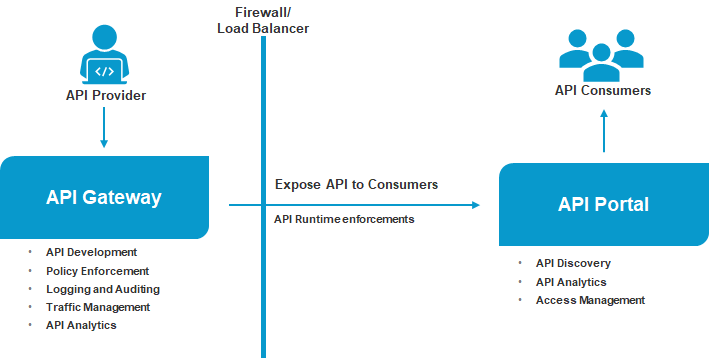What is webMethods API Portal?
webMethods API Portal is a web-based, self-service portal that enables an organization to securely expose APIs to external developers, partners, and other consumers for use in building their own applications on their desired platforms. API Portal provides the following features:
 Branding and customization. API Portal
Branding and customization. API Portal administrators can customize their portal’s logo, colors, and fonts to match their organization’s corporate identity. Administrators can further customize their portal by modifying pages, incorporating widgets, and changing the appearance and organization of APIs in the gallery for easier discovery. For example, APIs in a large catalog can be grouped by business domain, free versus paid, or public versus B2B partner. APIs can also be flagged based on maturity level (for example, beta versus production or release).
 Support for SOAP and REST APIs. API Portal
Support for SOAP and REST APIs. API Portal supports traditional SOAP-based APIs as well as REST-based APIs. This support enables organizations to leverage their current investments in SOAP-based APIs while they adopt REST for new APIs.
 Quick, secure providing of access tokens.
Quick, secure providing of access tokens. Approval workflows simplify the provisioning of API keys and OAuth2 credentials. These workflows enable the API provider to individually approve access token requests that developers submit from
API Portal.
 Easy discovery and testing of APIs.
Easy discovery and testing of APIs. Full text search capabilities help developers quickly find APIs of interest. API descriptions and additional documentation, usage examples, and information about policies enforced at the API level provide more details to help developers decide whether to adopt a particular API. From there, developers can use the provided code samples and expected error and return codes to try out APIs they are interested in, directly from within
API Portal, to see first-hand how the API works.
 Quick, secure onboarding of new users.
Quick, secure onboarding of new users. Easy to configure approval workflows in
API Portal graphical user interface to define how the user onboarding should take place, with or without confirmations.
 Community support. API Portal
Community support. API Portal provides a collaborative community environment where API consumers can rate APIs and contribute to open discussions with other developers.
 Built-in usage analytics. API Portal
Built-in usage analytics. API Portal provides dashboarding capabilities.
API Portal Administrator, API Providers, and API Consumers can access the dashboard that are visible to them based on their roles to view KPIs based on
API Portal page views and API views by users, lifecycle and access token events for an API, monitor the subscriptions per package, and access token requests per API, track total number of logins, active sessions, number of consumers, the success and failure of logins, user registrations, and user audit log, study the API's invocations per user and its performance during runtime, study the API invocation trends by response time, success and failure rates, and track the total API requests over a period of time, requests over time per API, and API request log. This information helps you understand how the APIs are being used, which in turn can help identify ways to improve users’ portal web experience and increase API adoption.
The following diagram illustrates the API Portal architecture:
The webMethods API management suite products include the following:
 webMethods API Portal
webMethods API Portal. In
API Portal, API consumers browse the catalog of APIs that a provider has published. When the consumer finds an API of interest, the consumer can sign up and request an access token to download the API for further investigation and testing.
API providers who have an API administrator role in API Portal can also view dashboards containing details about API run-time usage.
 webMethods API Gateway
webMethods API Gateway.
API Gateway enables an organization to securely expose APIs to external developers, partners, and other consumers for use in building their own applications on their desired platforms. It provides a dedicated, web-based user interface to perform all the administration and API related tasks from the API creation, policy definition and activation, creation of applications, and API consumption.
API Gateway gives you rich dashboard capabilities for API Analytics. APIs created in
API Gateway can also be published to
API Portal for external facing developers' consumption.
API Gateway supports REST-based APIs, SOAP-based APIs, and WebSocket APIs, provides protection from malicious attacks, provides a complete run-time governance of APIs, and information about gateway-specific events and API-specific events.
